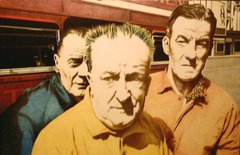
I wonder who will play Michael Vick in the destined to be released: “The Michael Vick Story.” If they wait five years, maybe Vick himself will play the roll. Or Denzel Washington. Or perhaps rap artist Snoop Dogg (for pun alone).
As another celebrity’s downfall dominates our media, I call the attention back to us. But first, the dogs. ‘Jane’, ‘Big Boy’, ‘Magic’ and ‘Tiny’ were just a few of their names.
We know the story. In 2001, the same year Vick became the number one pick in the NFL draft, he joined the multi-million dollar subculture of dog fighting. Six years and an army of trained killers later, Vick, 27, has pleaded guilty to felony charges and awaits a December trial deciding the next 1 – 5 years of his life—his NFL career suspended indefinitely.
While Vick called his actions “very immature,” I struggle to relate to a time in my life when I “matured” out of hanging, drowning, and electrocuting dogs. Some 6 – 8 dogs were killed during his “Bad Newz Kennels” (codename of this group) training sessions. Now the fate of the 53 remaining pit bulls, found in a blood-stained building, is up to you. Or at least it was until Thursday, August 23.
Prosecutors set Thursday as the deadline for all dog-loving Americans to adopt a ‘Magic’ or a ‘Tiny’. Unfortunately, no adoptions were made. What is to become of the remaining animals that Michael Vick didn’t kill? They become U.S. property and will be exterminated.
Initially, I struggled with this irony. Michael Vick kills half a dozen dogs and goes to prison for five years; authorities react by killing 53 more.
“These dogs are ticking time bombs and a threat to society. Euthanasia is the most humane thing for them,” a spokeswoman for animal rights argued. Well, if we’re now eliminating all threats to society, what about terror suspects held at Guantanamo Bay—should they be euthanized? As a Christian, I obviously value human life over canine, but not all people do. The decision to kill Vick’s dogs because of what they could do in society made me wonder: where is the line of applying human morality to animals?
Working in Yellowstone National Park this summer, I was in the heart of bear country. I avoided one Grizzly encounter while hiking with nothing but a book entitled “Death in Yellowstone.” Not comforting. So when an 11-year-old boy was killed by a bear in June, I was not surprised. 26 search dogs and a helicopter SWAT team hunted down and killed the bear that had been labeled a murderer. Something here reminded me of the infamous 1916 trial of “Murderous Molly”—a 5 ton circus elephant who was hanged for trampling two men in Tennessee. Surely I would want the aggressive bear that attacked my son in his tent destroyed, but we must be careful not confuse animal instincts with human motivations like revenge, greed, or meditated anger.
While ethically weighing what Michael Vick did, it is clearly not about killing dogs. If it was, the government would be equally guilty for euthanizing—a decision that is probably justified. Instead, this case is about the corruption that happened within Michael Vick, reflecting an idea Christ taught when he said: “…Anyone who looks at a woman lustfully has already committed adultery with her in his heart” (Mt. 5:28). Christ here is cautioning us against treating our thoughts and attitudes lightly.
It is unfortunate that this man’s mistakes have been sensationalized to the point of a Long Beach minor league team allowing free admission for fans who burned their Michael Vick jerseys. As citizens we need to control the attitudes within our heart, as Vick is learning, before we judge others’ actions.
Thankfully, it is the dogs who take the last bite out of this ex-star quarterback. And rightfully so. For just $10.99 your dog too could have its own Michael Vick chew toy from vickdogchewtoy.com. Who knows, I may buy one for myself.











